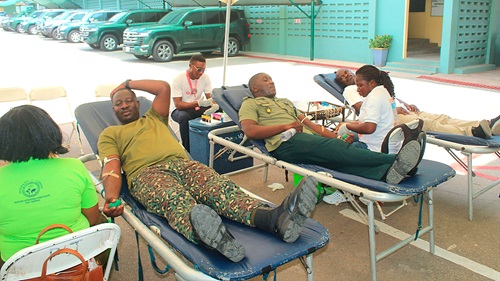The Ghana Immigration Service (GIS) has organised a blood donation exercise to support the National Blood Service in saving lives.
The exercise, which took place at the national headquarters in Accra last Friday, formed part of a series of activities lined up to commemorate the 20th anniversary of Recruit Intake Seven.
The initiative, held in collaboration with the National Blood Service (NBS), was open to all officers and the general public and had a target of about 90 participants.
The screening process involved checking the donor's haemoglobin level, with minimum requirements of 12 grams per deciliter for females and 13 grams per deciliter for males.
After donating, individuals were advised to consume foods rich in iron, such as milk, to help replenish lost nutrients. However, a balanced diet was ultimately recommended to maintain overall health.
Impactful Effort
The second in charge at the GIS medical unit, Deputy Superintendent of Immigration (DSI) Isaac Konadu, emphasised the significance of the exercise.
“It is very important because the service deals with a lot of people, and the health of individuals is key in all spheres of life,” he said.
He further explained that the nature of their work often required urgent blood access for emergencies, making such partnerships with the NBS crucial.”
We used to get calls from people who are in critical need of blood. It puts a lot of pressure on us. This initiative will help bridge that gap,” he said.
Call to action
DSI Konadu also debunked misconceptions about blood donation, saying, “Blood donation actually helps your body. The blood cells have a lifespan of 120 days, and the bone marrow has the ability to regenerate them. It even reduces the risk of cardiovascular diseases.”
He urged the public to take part in blood donation exercises.
Donor Recruitment Officer at the National Blood Service, Rune Yao Agbley, stressed the urgent need for voluntary donations.
“Blood is not made in laboratories. The only way we can get blood to save people is through donations,” he said.
He encouraged the public to consider donating as an act of charity and civic duty, indicating that patients with conditions such as sickle cell, kidney failure and others were dependent on timely blood supplies.
To donors
Laboratory scientist at GIS clinic, Bernice Sam, mentioned that potential donors may appear healthy but have underlying medical conditions that could make them ineligible to donate.
She advised that to ensure a smooth donation process, potential donors were to eat a light meal beforehand, as heavy meals can cause discomfort after donation.

